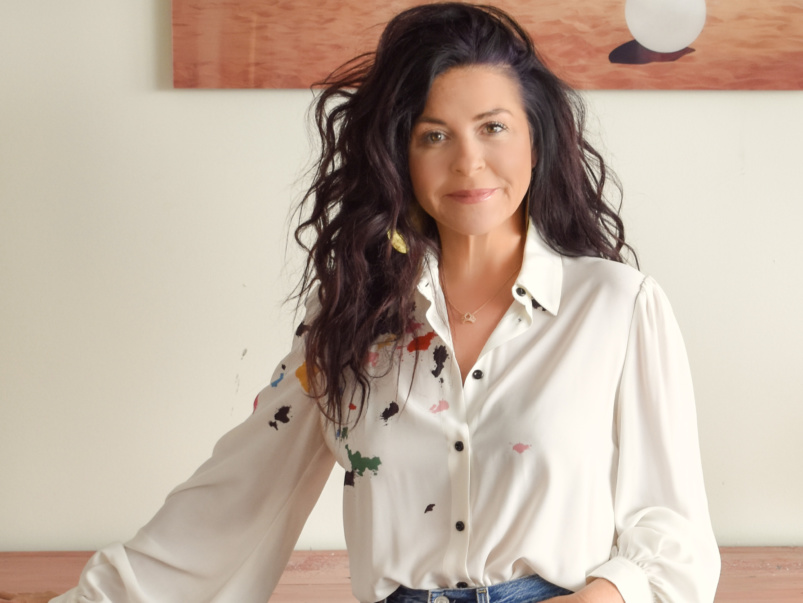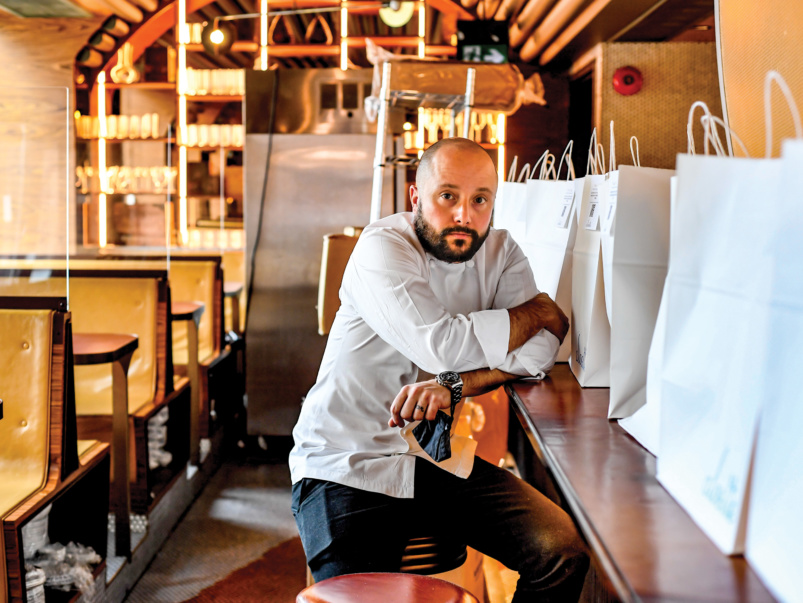“I’d be the primary caregiver all day and then run the business until 2 a.m.”: The owners of Montgomery’s on why they were ready to close their Queen West restaurant

Five years ago, husband-and-wife team Guy and Kim Rawlings opened Montgomery’s in West Queen West. Veterans of the city’s hospitality scene, and parents of two kids under three at the time, the couple injected their local-obsessed ethos into every inch of the intimate spot. When Covid hit, they built a grocery-box business that gave their customers access to food right from their farmers. But despite a successful pivot, they announced in April that Montgomery’s would be closing. Here, they memorialize a restaurant that meant so much to them and their loyal regulars, and discuss the “logistical nightmare” of prepping CSA boxes and why this isn’t goodbye, but see ya later.
Kim: Guy and I always knew that someday we’d open a restaurant together. For one, Guy was a chef, and my background was in event planning, marketing and PR—I helped launch big venues in the city, like 99 Sudbury and Circa. I loved being involved in things that brought the community together, and restaurants fit that mould.
Guy: I’ve worked in restaurants and hospitality for 20 years—in England, China, the U.S. and all over Toronto. I spent time in the kitchens of the Brockton General, Bellwoods Brewery and Bar Isabel, to name just a few. But I’ve got a short attention span and was always the guy who was working three-to six-month contracts. I liked being able to do lots of different things.
Kim: Two months after Guy and I met, we were engaged. Nine months later, we had our first child. We got the lease for the restaurant when our second one was just a year-and-a-half old. I was coming out of a deep mom zone with two kids under three and had to clear my eyes to get ready to open this restaurant. But we’d been writing down our thoughts and goals for the space: to be a real Canadian restaurant and something that didn’t exist in the city at that time. We had no investors, we financed it all ourselves on a very stringent budget.
Guy: Where we ended up opening the restaurant was the least ideal area for us. Queen West is weird—if you go up and down the street people are always on their phones, they really care about their appearance. We wanted a restaurant where people could leave their phones behind, leave the chaos behind and just have a conversation with someone. But this space fit our needs—and it didn’t hurt that its cinder block walls made for bad cell reception. When Covid first hit, we didn’t realize how much of a long-term thing it would be. So we actually spent three weeks of the first lockdown painting the place, ripping out the carpet, making new tables. I still have $1,000 worth of stools that are never going to be used—they’re still in boxes. But once we realized what we were in for, things changed pretty quickly.

Kim: Our childcare is affiliated with a school, so our daycare closed pretty much right away, and we didn’t feel comfortable getting help from my mom, because we wanted to keep her safe. I went from being Guy’s business partner to a stay-at-home mom. It was bittersweet. I was lucky to have the time with our family, but it was very difficult. I was doing virtual school with a kindergartener and a grade one, while also taking care of a 10-month-old baby. I’d be the primary caregiver all day, and after the kids went to bed, I’d tidy up. By nine o’clock, I’d be sitting in front of the laptop running the administrative side of the business until two in the morning. Then I’d wake up at 6:30 a.m. with the kids and do it all again. Harnessing our patience became really important to us.
Guy: I had it easy compared to Kim. I can put my head down and work 16-, 18-hour shifts, seven days in a row and I’ll be fine, just tired.
Kim: We knew we wanted to offer some form of 100 per cent locally sourced groceries and pantry items because we were already working with some great farmers, and it’s an excellent way to build community out of your space. We’d actually wanted to do it before the pandemic. But the first product list Guy sent out was an Excel spreadsheet with hundreds and hundreds of items on it. It was a logistical nightmare because people were able to check off whatever they wanted. And we didn’t have an online store, we didn’t have any technology to support this, we just let people email it back to us. And we would spend days just looking through the sheets and collating the information.

Guy: I went down some insane Excel formula wormholes. It was a dark time! We eventually got our website built and the system up and running that handled our administrative and logistical needs. But it wasn’t easy. We didn’t pay ourselves throughout the whole year. We had 1,700 square feet on Queen West. That was four times what we needed and obviously not cheap. We were still selling wine and groceries but our profit margins were completely different—a $30 bottle of wine from producers that we would typically sell for $75 at the restaurant, we had to sell for just $42. And with raw produce, we weren’t treating it in any creative way, so our profits were diminished overall. We also didn’t qualify for a bunch of subsidies because our business model changed. There were times we wished we’d sat back and gotten a handout. It would have been much less stressful. But we were trying to make an effort to do something, to build something we were proud of. We did lose our minds a few times, but we’re lucky that the support we got from our customers was amazing.
Kim: The pandemic has really shown that there are breakdowns in the food distribution system, and people have become more aware and keen to support local. I was shocked and astounded but very appreciative of the response that we got right away. What’s come out of this is a grocery system that we can pick up and take anywhere.
Guy: Our lease was up for renewal later this year. If we wanted to renew, we had to give six months’ notice. We went back and forth wondering if we should reinvent the space to be more of a grocery store. But the main factor was our family. Our kids aren’t getting any younger, and eventually they’re going to want to hang out with their friends—not us. By closing the restaurant, we can spend more time with them right now. This past year also really taught us the importance of taking a step back. When you’re in the grind, it’s really difficult to think of other things you want to do. Some time away from this project will help us decide what we want to do next. It’s going to be like regenerative agriculture for our brains. And once we’re feeling good, both mentally and physically, we’ll figure out what comes next.
Kim: When people heard we were closing Montgomery’s, they came to us with actual tears in their eyes, saying, “I’m so sorry.” We had to stop them and say, “But we’re so happy.” Yes, this has been a terrible year for restaurants. But I’m thankful that we were able to become a fixture of this neighbourhood. I’m appreciative that the decision was made for our own personal reasons.
Guy: We didn’t close a restaurant and it’s not an ending. This was a project, this was a chapter we did for five years and we’re very excited to move forward from here.







